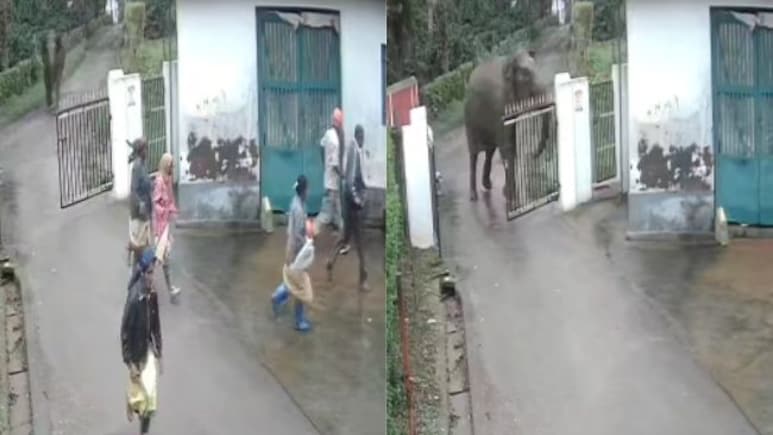
- Over 15 estate workers narrowly escaped a wild elephant charging near a coffee estate in Kodagu
- No injuries were reported but workers fear returning and demand safety measures
- Forest officials plan a drive to steer the elephant back into its natural habitat
Over 15 estate workers narrowly escaped a wild elephant that charged at them near a coffee estate in Pollibetta, Kodagu (Coorg), on Monday morning. The incident was caught on camera.
The footage, dated July 28, shows a group of workers breaking into a frantic run. Moments later, an elephant is seen charging down the same road. The workers manage to flee into a gated compound just in time, with the elephant following closely behind.
The elephant approached the compound gate, appearing to push it open. But it stopped, turned around, and disappeared into the surrounding bushes.
Though no injuries were reported, the close call has left estate workers too fearful to return. Many have stayed away since the incident and are demanding swift action from authorities to ensure their safety.
Forest officials have announced plans to conduct a drive on Wednesday to steer the elephant back into its natural habitat.
Kodagu, known for its dense forests and coffee plantations, has witnessed a rise in human-elephant conflicts in recent years due to habitat loss and shrinking corridors for wildlife movement. Located in the Western Ghats, these lands once supported elephant corridors, but over the past two decades, forest cover has declined by about 18 per cent, with nearly 46 per cent lost in dry deciduous areas, forcing elephants into nearby human-dominated zones.
At least 44 people have died in wild elephant attacks in Kodagu between 2019 and 2024, reported The Kodagu Express. Hotspots include Madikeri taluk, the Nagarahole Tiger Reserve periphery, and Virajpet. With around 2,000 elephants living in Kodagu (nearly a third of Karnataka's entire elephant population), encounters have become more frequent and intense.
To address the crisis, the Karnataka government has sanctioned Rs 40 crore for immediate mitigation. Measures include trenching, railway barricades, solar fencing, and elephant-proof trenches in high-risk areas like Virajpet. A major component of this plan is the proposed relocation of 185 conflict-prone elephants, especially from southern Kodagu and the Kutta border zone.
The state is also investing in science-driven solutions. A Rs 4.7 crore partnership between the Forest Department and the Indian Institute of Science (IISc) aims to study elephant behaviour, track movements via satellite, and develop predictive models to prevent future conflict. The five-year study will also focus on mapping historical migration corridors and understanding the health and stress levels of these elephants.

